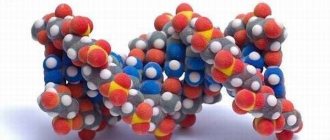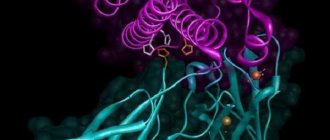Follicle-stimulating hormone (FSH, follitropin)
is a pituitary hormone that regulates the functions of the gonads. Interacts with receptors on ovarian and testicular cells. Accelerates the formation of follicles, stimulates the formation of estrogens, activates spermatogenesis.
An analysis for follitropin is prescribed by a general practitioner, pediatrician, gynecologist, andrologist, endocrinologist, and reproductive specialist. It allows you to identify and determine the form of violations. Dysfunction is of the following types
- primary, caused by the gonads themselves;
- secondary, as disorders of the hypothalamic-pituitary system.
Get tested for FSH
If a person has dysfunction of the testicles (ovaries), in this case, a low level of FSH indicates a disruption in the activity of the hypothalamus or pituitary gland. An increased rate is noted in patients with primary pathology of the gonads. Together with the analysis for follitropin, tests can be prescribed to determine the amount of the following hormones: testosterone, progesterone, prolactin, estradiol. Studies on globulin, androstenedione, inhibin B, as well as spermogram and other tests will help to obtain additional data.
Follicle-stimulating hormone analysis is prescribed to solve the following problems:
- Identification of the causes of the development of sexual dysfunctions - primary or secondary nature of the disorders.
- Determining the cause of infertility. In this case, it is also necessary to obtain test results for testosterone, progesterone, luteinizing hormone and estradiol.
- Search for the cause of spermatoginesis disorders.
- Calculation of the menstrual cycle and or menopause.
- Diagnosis and monitoring of early and late puberty.
- Determining the effectiveness of hormone therapy and monitoring treatment.
- Analysis for follitropin (FSH) and luteinizing hormones (LH) allows the doctor to determine the tactics of treating infertility in both men and women.
General concepts
What is the hormone FSH? This is a substance that affects human sexual development and is constantly present in the blood in different concentrations, depending on age. The hormone regulates the normal function of the body’s reproductive system - it stimulates the growth and development of follicles in the ovaries, as well as the maturation of male sperm. The hormone may be decreased, increased, or within the normal range determined in the laboratory. During puberty, the level of follicle-stimulating hormone increases greatly, especially at night. This process promotes the development of the gonads and active hormonal production. The hormone promotes the development and maturity of follicles in the ovaries, prepares the body for the action of LH, affects the first phase of the cycle and promotes the release of estrogen. FSH in men increases testosterone, promotes the formation and maturation of ejaculate, proteins and seminiferous tubules. The study helps to identify the level of hormonal imbalances (gonads, hypothalamus and pituitary gland). Follicle-stimulating hormone in men is an indicator of impaired spermatogenesis and low sperm count. Follitropin identifies sexual disorders, dysfunctions, diagnoses early or late puberty, and monitors the effectiveness of hormonal therapy. A low level of the FSH hormone indicates disorders in the functioning of the ovaries or testicles, and a high level indicates primary pathologies of the gonads. The hormone is studied simultaneously with LH (luteinizing hormone), testosterone, estradiol, progesterone to identify the factor of infertility and prescribe adequate therapy.
General information about follitropin and the study
FSH is produced sporadically together with LH hormone by basophilic cells of the pituitary gland. With reduced secretion (deficiency) of hormones, the following symptoms are noted:
For men:
- insufficient growth and general developmental delay;
- congenital and acquired underdevelopment of the gonads;
- inhibition of spermatogenesis processes.
Among women:
- underdevelopment of the mammary glands;
- inhibition of follicle maturation;
- infantilism, frigidity, infertility.
This happens because sex hormones directly interact with cell receptors in the testicles and ovaries. With reduced production, exposure is insufficient to stimulate the development of primary and secondary sexual characteristics during adolescence. Subsequently, hormonal deficiency also affects the development and rate of development of follicles in the ovaries and during spermatogenesis.
FSH level in blood and cycle phases
(estrogen phase) begins on the first day of the menstrual cycle.
when this hormone is intensively produced. In women, it stimulates the development and maturation of the follicle. Under the influence of luteinizing hormone (LH) from the pituitary gland, the follicles begin to secrete estrogen. This steroid hormone is responsible for body physiology and sexual functions.
In the middle of the monthly cycle, the level of estrogen in the blood becomes quite high, so the pituitary gland secretes a large amount of LH, and the level of follicle-stimulating hormone is reduced.
The level of follicle-stimulating hormone during this period is significantly lower than in the first half of the menstrual cycle. The second phase begins
ovulation, when luteinizing hormone (LH) in women reaches a certain level.
A mature follicle in the ovary bursts and an egg is released. Ready for fertilization, it is sent into the uterine cavity through the fallopian tubes to “meet” sperm. The follicle from which the cell emerged turns into the corpus luteum. This phase is called the luteal phase.
The corpus luteum, which is formed from a burst follicle, begins to intensively produce the steroid hormone progesterone. It blocks the pituitary gland's production of gonadotropic hormones. Increased levels of progesterone in the blood directly affect the decrease in FSH and LH levels in women.
If the egg was not fertilized in the uterus and pregnancy did not occur, then the corpus luteum of pregnancy is destroyed and progesterone levels drop. After this, the pituitary gland begins to intensively produce gonadotropic hormones: FSH in the blood is increased - the follicular phase begins
menstrual cycle. This phase lasts for an average of 14 days, although if the menstrual cycle is longer, ovulation occurs later.
In the event of pregnancy, the pituitary gland begins to produce choriogonin (hCG - human chorionic gonadotropic hormone). All pregnancy tests are based on detecting the level of hCG in the blood.
Typically, hCG is released in large quantities 10-14 days after ovulation. It also affects the development of the corpus luteum of pregnancy. Progesterone in the corpus luteum prepares the uterus for implantation and gestation. This is why estrogen and progesterone levels are elevated during pregnancy.
When is a follitropin test prescribed?
- For infertility in both sexes.
- If you suspect the presence of hormonal disorders of sexual function.
- Problems with ovulation and miscarriage.
- If pituitary pathology is suspected.
- Disruptions of the menstrual cycle (unsystematic or complete absence).
- Congenital, genetic diseases.
- Impaired growth (short stature) and puberty in adolescents.
- Chronic inflammation of the reproductive system.
A test for follitropin is prescribed during hormonal therapy to monitor the treatment process and adjust the intake of medications.
Decoding the analysis results
Normal FSH levels in men range from 0.7 to 11.2 mIUml.
The indicator in women depends on the menstrual cycle
Phase I from 2.8 to 12.5 mIUml;
Phase II from 1.2 to 9.1 mIUml;
ovulation period from 5.8 to 21.1 mIUml;
premenopause (beginning of menopause) from 1.7 to 25 mIUml;
postmenopause (menopause) from 21.7 to 153 mIUml.
Follicular phase of the menstrual cycle
The follicular phase is so named because during this period several follicles begin to develop. To initiate the follicular phase, the pituitary gland secretes the FSH hormone.
Around day 6–7 of the follicular phase, one follicle is released and continues to grow and develop. Within about two weeks, an egg matures in it, which must be fertilized by a sperm.
From the beginning of the follicular phase until the ovulation phase, the amount of estrogen gradually increases. The follicular phase ends. If for women it takes 28 days from the first day of menstruation to the start of the next menstruation, then the follicular phase lasts 14 days. If the menstrual period is longer, then the follicular phase of the cycle occurs later.
FSH: normal
In laboratories, the hormones LH and FSH are measured in international units per liter. You need to be tested for FSH, prolactin, LH and other hormones on an empty stomach. An analysis for follicle-stimulating hormone is taken on the 3rd–5th day of the cycle (follicular phase period).
Normal for women
The FSH norm in women varies throughout the menstrual cycle:
follicular phase of the cycle - 2.8–11.3 mU/l;
ovulatory phase of the cycle - 5.8–21 mU/l;
luteal phase of the cycle - 1.2–9 mU/l.
Normal for men
Normal FSH levels in men should be between 1.37 and 13.58 mU/L. If FSH levels are low, the child may experience delayed puberty.
If the analysis shows an insufficient amount of this hormone in a woman, the following symptoms may occur:
- scanty periods;
- lack of ovulation;
- infertility;
- atrophy of the mammary glands and genital organs.
The reasons for reduced FSH levels in women may be obesity and polycystic ovary syndrome, as well as disorders in the hypothalamus.
Low FSH in men indicates:
- impotence;
- lack of sperm in semen;
- testicular atrophy.
In men, low levels of this hormone may be due to insufficient function of the pituitary gland.
With low FSH levels, both men and women experience decreased libido, decreased body hair growth (secondary sexual characteristics), and wrinkled skin.
High FSH
When FSH is elevated, women may:
- uterine bleeding not associated with menstruation occurs;
- no menstruation.
Elevated FSH is normal in women during menopause.
Causes:
- ovarian failure;
- pituitary tumor;
- alcoholism;
- endometrioid cysts;
- exposure to x-rays.
A man may have increased FSH with:
- impaired functioning of the gonads (including inflammation of the testicles);
- increased amount of male hormones;
- X-ray irradiation;
- renal failure;
- alcoholism;
- pituitary tumors;
- taking certain medications.
A decrease in the level of follicle-stimulating hormone is observed in the following conditions
- Secondary ovarian failure caused by a deficiency of individual pituitary hormones of the anterior pituitary gland.
- Kallmann syndrome (hereditary deficiency of LH and FSH, delayed onset or complete absence of puberty).
- Sheehan's syndrome (complication during childbirth, as a cause of hypopituitarism).
- Polycystic ovary syndrome (hypersecretion of steroid hormones, insulin, androgens).
- Pituitary insufficiency (deficiency of pituitary hormones).
- Hyperprolactinemia (increased prolactin levels).
- Hemochromatosis (hereditary disorder of iron metabolism and its accumulation in the body).
- Isolated FSH deficiency.
- Dwarfism.
- Anorexia, forced fasting, malnutrition.
- Neoplasms of various localization on the tissues of the ovaries, testicles and adrenal glands.
Rules for taking an analysis for FSH levels
For the study, blood is taken from a vein. Before taking a test to determine the concentration of follicle-stimulating hormone in a woman’s blood, it is necessary to prepare in order to obtain the most reliable results. The preparatory stage includes the following recommendations:
• For three to four days, various physical activities and sports training are completely excluded;
• One day before taking blood, it is recommended not to have sex;
• Immediately before the test, a couple of hours, you must stop smoking;
• You should stop taking any medications, especially hormonal drugs, for several days.
Venous blood is collected only in the morning on an empty stomach. It is also important not to worry or be unnecessarily nervous before the study.
The analysis is carried out in three approaches: at least 30 minutes must pass between each blood draw. This is necessary because during the period of testing, the FSH level fluctuates significantly, and taking blood three times will help determine the most correct indicator. In most cases, FSH is determined on the 9-11th day from the start of menstruation, but sometimes it may be necessary to measure the level of this hormone on other days (it all depends on the clinical situation).
Hormone deficiency
With low levels of follicle-stimulating hormone, the following pathologies may appear in a girl’s body:
- reduction of menstrual bleeding;
- the egg does not leave the ovary;
- problems conceiving a child;
- atrophy of the reproductive organs and breasts.
Changes in the concentration of the substance can result from excess weight, polycystic ovary syndrome, dysfunction of the hypothalamic-pituitary system.
In men, the consequences of a decrease in FSH in the blood are impotence, aspermia, and decreased testicular function. Pathology develops due to disorders in the pituitary gland.
With a low FSH level, a person experiences a decrease in libido, a decrease in body hair, and early age-related skin changes.
Normal values
Indicators are selected individually for each woman, taking into account her age and stage of the menstrual cycle. For men, the reference values are constant.
Data from a single analysis of FSH levels is not enough to determine the causes of infertility in a man or woman. Despite the fact that you can decipher the results yourself, in isolation these data have no diagnostic value. The doctor pays attention to the medical history of each patient and the results of comprehensive laboratory diagnostics.
For your reference, the table shows the values of follicle-stimulating hormone for all ages and both sexes.
| Floor | Age | General reference values, honey/ml | Reference values taking into account the stage of a woman’s cycle, honey/ml |
| Female | Up to three years | From 0.11 to 13 | Not determined |
| From three to nine years | From 0.11 to 1.6 | ||
| Later, until menopause | Follicular phase: from 3.04 to 8.08 Ovulation: from 2.56 to 16.66 Luteal stage: from 1.38 – 5.48 | ||
| Postmenopausal | From 26.73 to 133.42 | Not determined | |
| Men | 0 - 1 year | Less than 4.2 | |
| 15 years | Less than 1.5 | ||
| 5 – 11 years | Less than 2.95 | ||
| 11 – 18 years old | 0,03-3.9 | ||
| After 18 years | 0.95-11.95 | ||
It should be noted that during premenopause, increased FSH is observed in women. This is explained by the fact that the ovaries no longer function, which means that the concentration of female sex hormones is sharply reduced. According to the feedback principle, the body tries to compensate for their deficiency and stimulate the process of their formation, producing for this a large amount of follicle-stimulating hormone.
When taking oral contraceptives, the hormone norm is up to 5 mIU/ml.
FSH hormone in women
Follicle stimulating hormone plays a huge role in the body. In an adult woman, FSH stimulates the maturation of ovarian follicles and enhances the release of estrogens. The menstrual cycle consists of follicular and luteal phases. The first phase of the cycle takes place under the influence of FSH: the follicle enlarges and produces estradiol, and at the end, a sharp increase in the level of follicle-stimulating hormone provokes ovulation - the rupture of a mature follicle and the release of an egg. Then comes the luteal phase, during which FSH promotes the production of progesterone.
FSH hormone is responsible for the following processes occurring in a woman’s body:
- sexual development
- regularity of the menstrual cycle
- ovulation
- fertilization of the egg and promoting a healthy pregnancy.
What is FSH?
Follicle-stimulating hormone (FSH) is a sex hormone that plays an important role in human sexuality. FSH is synthesized in the pituitary gland, and the synthesis of a new portion of the hormone occurs every 2-3 hours. After synthesis, the hormone immediately enters the blood, and the amount of FSH increases sharply, but after 15-20 minutes the concentration of this substance in the body returns to normal. FSH is synthesized in the pituitary gland under the influence of other hormones, so the presence of hidden disorders can be determined by the amount of FSH in the body.
FSH is produced in both female and male bodies, however, in sexually mature men the concentration of this hormone is constant, but in women the amount of FSH directly depends on the phase of the menstrual cycle. After birth, the concentration of FSH increases sharply in both boys and girls, but after 6-12 months the amount of FSH sharply decreases. The FSH level increases again during puberty, and after puberty the amount of FSH stabilizes within certain limits (in men the amount of the hormone is constant, in women it depends on the stage of the menstrual cycle).
FSH is one of the most important hormones that regulates the menstrual cycle, since it is under the influence of FSH that follicles mature in the ovary. The mechanism of influence is as follows:
- At the early stage of menstruation, FSH stimulates follicle growth. This hormone also improves the synthesis of another hormone called estradiol - this substance also takes part in hormonal regulation of the body.
- Somewhere in the middle of the menstrual cycle, FSH, together with luteinizing hormone (LH), provokes rupture of the follicle, which is normal during ovulation, and as a result of rupture of the follicle, an egg is formed that is capable of fertilization.
- After the release of the egg, FSH switches to stimulating progesterone synthesis. Progesterone is a key hormone in the female body that performs many functions. If the body synthesizes insufficient amounts of progesterone, then the menstrual cycle is disrupted (although eggs still continue to be produced). If the body contains a reduced amount of progesterone, and at this time fertilization of the egg occurs, then there is a high probability that the egg will not go through the implantation stage, which will lead to the death of the egg. Therefore, we can say that FSH affects the ability to conceive, and a lack of this hormone can lead to infertility.
FSH also plays a major role in hormonal metabolism in the male body:
- If a man's body contains the optimal amount of FSH at an early stage of life, then the spermatic cords will grow and develop normally. If there is a deficiency of this substance, the cords will develop very slowly, which can lead to the development of infertility.
- In older age, FSH is responsible for the synthesis of testosterone. This substance is the main male hormone; Testosterone has many functions - sperm formation, behavior regulation, muscle growth, and so on.
- In adulthood, FSH also directly affects sperm synthesis in the testes; if this substance is not enough, then in this case only a small number of weak sperm are formed, which are practically unable to fertilize the egg, therefore FSH in adulthood also affects the male ability to conceive
If there is a suspicion of infertility, then the doctor may prescribe a test to determine the concentration of FSH in the blood. For the analysis, you need to take blood from a vein, and deciphering the results usually takes 2-3 days.
The table of normal FSH values is as follows:
| Gender or stage of the menstrual cycle | FSH concentration (units: mIU/ml) |
| Puberty men | 2 – 12 |
| Days 1 – 14 of the menstrual cycle | 3 – 13 |
| 14 – 16 days of the menstrual cycle | 5 – 22 |
| 16 – 28 days of the menstrual cycle | 1 – 12 |
In case of deviation from the norm, it is recommended to donate blood for analysis again after a certain time, since the concentration of FSH periodically increases sharply (this is a normal reaction, since this hormone is released into the blood in a pulsed manner). If the second analysis shows a significant deviation from the norm, then the doctor must conduct additional research, and if necessary, he must draw up a treatment plan that the patient must adhere to.
High FSH levels
In the presence of increased secretion of follicle-stimulating hormone, anovulatory bleeding may occur. Elevated FSH values are typical for women during menopause. In cases where the concentration of the hormone is increased during reproductive age, assumptions can be made about the reasons that influenced this condition, for example, a high amount of testosterone, tumor processes in the pituitary gland, dysfunction of the gonads, renal failure and other pathologies. FSH concentrations increase due to long-term use of certain types of medications.
The ability to conceive a child, bear a child and give birth is controlled by the ratio of the levels of the hormones FSH and LH. Based on the obtained coefficient, conclusions are drawn about how capable the female body is of conception, and this ratio depends on age criteria.
Before puberty, the ratio is as follows: 1:1, after the appearance of menarche (first menstruation), these values will be 1.5:1, after a few years the normal numbers will reach 2:1. When the ratio of FSH and LH reaches 2.5:5, this may indicate tumor tumors in the pituitary gland, polyendocrine polycystic ovary syndrome (PCOS) or their depletion.
With FSH values within 40, the inability to conceive a child is also observed in young girls. Therefore, it is necessary to reduce the production of the hormone for a certain period of time before artificial fertilization (in vitro).
Signs of mastopathy in women
Increased production of FSH is not considered a specific disease; it is generally just a sign of pathology. Essentially, follicle-stimulating hormone levels reflect the functioning of the ovaries. Therefore, to normalize FSH concentrations, it is necessary to begin treatment of the underlying pathology. Thus, with primary ovarian failure, the concentration of the hormone is usually increased, while with secondary ovarian failure, FSH is significantly reduced. The pathological processes listed above are always accompanied by a woman’s inability to become pregnant. To normalize reproductive function, various treatment methods are used. Each specific case requires individual medical tactics.
To treat excessively high levels of FSH in a woman’s blood, treatment with estrogen hormone replacement therapy is used (the therapeutic effect is based on the feedback mechanism of hormonal influences). The dosage is determined by the treating specialist, depending on the level of FSH and the personal characteristics of the female body. As a rule, secondary sexual characteristics begin to develop after treatment.










